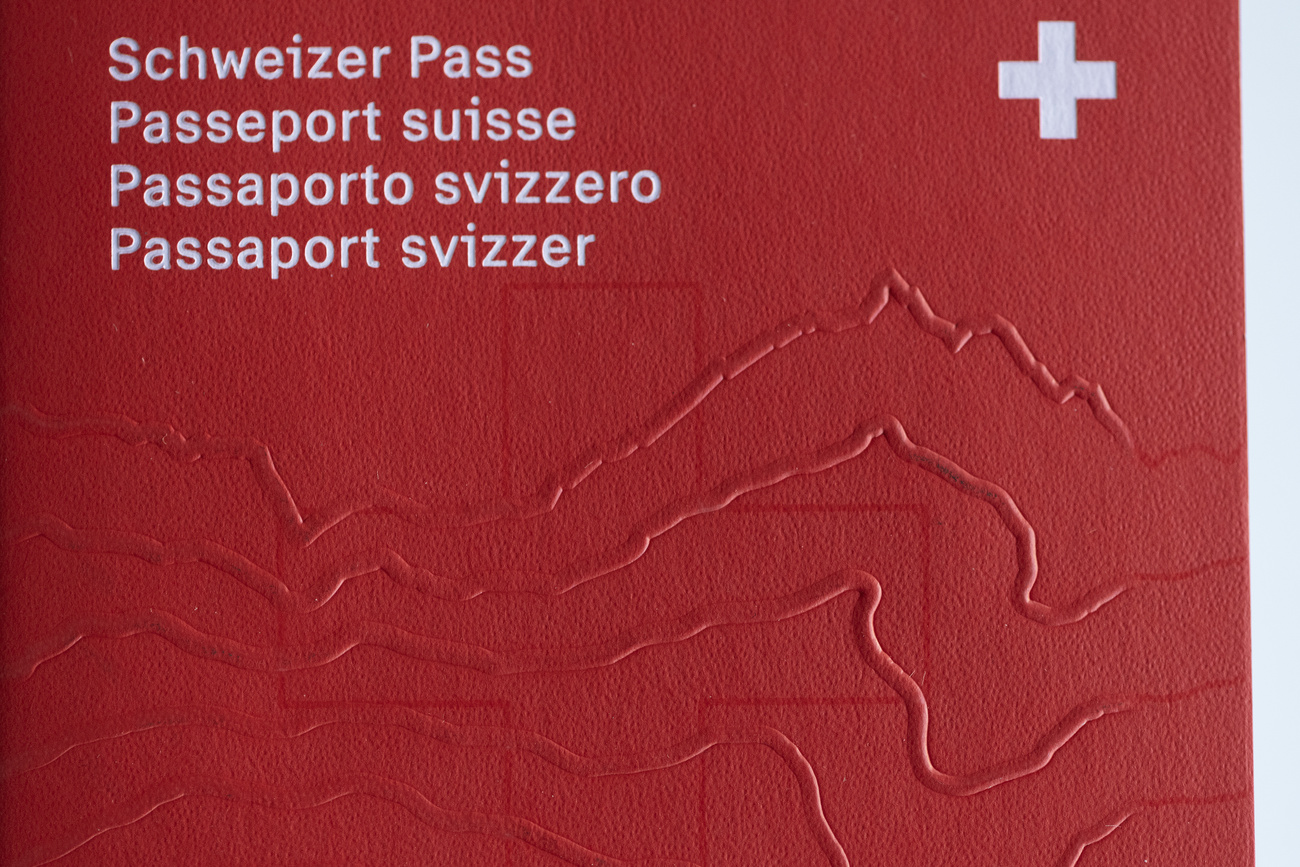
Golden passport? Certain groups struggle to obtain Swiss citizenship, study shows

The difficult path to Swiss citizenship is getting more selective: well-educated and well-off immigrants are pulling ahead when it comes to getting a passport, a study shows.
Unless you’ve married a Swiss or have a Swiss parent, becoming a citizen of the Alpine nation can be a rigmarole. For adults, there’s a minimum residency period of ten years. There the sometimes high costs. And then there are the obscure test questions (which is bigger: Lake Neuchâtel, Lake Lucerne, or Lake Zurich?) and the unpredictable reasons you could be refused, such as mowing your lawnExternal link on public holidays (though some of the more questionable objections have been nullified by courts). Navigating the path to Swiss citizenship and naturalisation can indeed be challenging.
And after a 2018 overhaul of the rules, it’s not getting easier – or at least not for everyone, according to a studyExternal link by a government advisory body the Federal Commission on Migration (FCM).
Between 2018 and 2020, the proportion of university graduates among “ordinary naturalisationsExternal link” rose to 57%. This is up from 33.5% under the old law. Meanwhile, newly minted Swiss citizens with only a basic education fell from 23.9% to 8.5%. During this period, the overall number of naturalisations also dropped, though it has risen again since.
Anecdotal observations by citizenship officials confirm the trend, the study says. They draw a caricature of the “typical” new citizen: well-educated, between 20 and 40, living in an upmarket area, and aware of the rules associated with applying.
Want to read our weekly top stories? Subscribe here.
Swiss Citizenship Language requirements
The study outlines three main reasons for the shift. First, the 2018 reform cut the required residency period for citizenship from 12 to 10 years. It also stipulated that only permanent residents (C permit holders) could apply. This change excludes around a fifth of applicants under the old law who held short-term or provisional permits. It favors migrants from a select group of European states with whom Switzerland has signed agreements to facilitate residency.
Another factor is the “paradigm shift” towards focusing more explicitly on how well-integrated aspiring citizens are. Along with the test questions on geography, history, and society, there is now a minimum level for one of the Swiss national languages: B1 spoken, A2 written. Achieving this written standard is especially hard for many people, the report says. Meanwhile, it encourages applicants who already speak a Swiss language, such as immigrants from Germany, France, or Italy.
Lastly, while the new rules provide a “more precise legal framework” for naturalisation, the 26 Swiss cantons still enjoy significant freedom in setting rules. These include language requirements or financial independence. There are big differences: some cantons exclude anyone who has received social welfare in the past ten years. Others set this bar at three years. “It can be more chaotic than federalist,” says FCM president Manuele Bertoli.
Structural discrimination in Swiss citizenship application?
However, the report comes with some caveats. For example, the short time studied means “more research is needed,” it admits. There’s also the question of whether the shift in citizenship profiles could be based on demographic factors. Since the introduction of the free movement of people agreement with the European Union in 2002, overall immigration to Switzerland from (often well-educated) EU countries has grown strongly.
Yet Bertoli says the “spike in highly educated applicants, along with the fall of those with fewer qualifications, is so big that it’s difficult to explain only by immigration patterns.” Likewise, the report, drafted by researchers from the universities of Neuchâtel, Basel, and Geneva, clearly suggests that the requirement to hold a C permit makes things difficult for “already marginalised groups” such as asylum-seekers.
While certain criteria are unavoidable, the “high selectivity of the new rules goes beyond what’s permissible” and represents a case of “structural discrimination,” the researchers write.
In a recent interview with SWI swissinfo.ch, one of the study’s co-authors, Barbara von Rütte, was even clearer. In making naturalisation tougher for non-EU nationals, the system risked discriminating against “non-Christians and non-whites” from the Global South, she said. The rules about social welfare could also unfairly impact single women, who are disproportionately dependent on such aid, she added.
Bartoli and von Rütte agree that a wider debate is necessary. “Do we want only highly qualified citizens?” von Rütte said. “The social repercussions of such a scenario must be part of a political discussion, which has not yet been launched.”

More
7 questions on Becoming Swiss: ‘Where do I sign?’
Debates to come about citizenship
That said, debates about citizenship and how to get it are not unknown in Switzerland. Ideas are periodically raised in parliament, such as a failed 2021 bid to grant citizenship to everyone born on Swiss soil. Voters have also had their say. Most proposals to ease naturalisation have failed, but in 2017, 60% of Swiss backed a reform to ease the procedure for the grandchildren of immigrants.
Meanwhile, a civil society campaign is lobbying for an ambitious expansion of rights. The “four-quarters” movement – named after the 25% of Swiss residents without citizenship – wants a public vote on allowing naturalisation after five years in the country, regardless of status.
The movement’s president, Arber Bullakaj, said he was not surprised by the results of the FCM study. Whole groups are “de facto excluded” from the citizenship process by the language and integration rules, Bullakaj told SWI swissinfo.ch. The 2018 law was a “blow to the whole working class” and was one of the reasons his group launched the initiative, he added. They have until November to collect 100,000 signatures for a public vote.
As for the FCM study, this will be forwarded to the government, parliament, and the State Secretariat for Migration, among others, Bertoli says. The report’s various ideas about inclusive models of citizenship will serve as a “basis” for when the FCM next meets – at which point it could potentially make formal recommendations to authorities.
Edited by Marc Leutenegger/ts

More
Switzerland Says Sorry! One passport to rule them all

In compliance with the JTI standards
More: SWI swissinfo.ch certified by the Journalism Trust Initiative































You can find an overview of ongoing debates with our journalists here . Please join us!
If you want to start a conversation about a topic raised in this article or want to report factual errors, email us at english@swissinfo.ch.